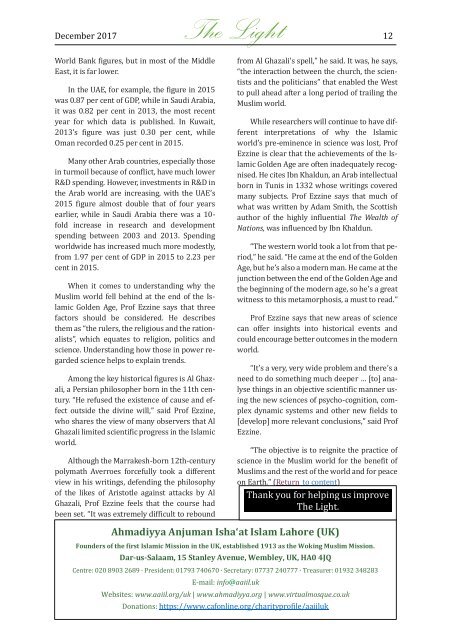The Light English Edition December 2017 issue
Organ of the Worldwide Ahmadiyya Association for the Propagation of Islam. Preaching Islam as taught by the Holy Prophet Muhammad (s) - a tolerant, peaceful. loving, inclusive, rational and tolerant Islam.
Organ of the Worldwide Ahmadiyya Association for the Propagation of Islam. Preaching Islam as taught by the Holy Prophet Muhammad (s) - a tolerant, peaceful. loving, inclusive, rational and tolerant Islam.
Create successful ePaper yourself
Turn your PDF publications into a flip-book with our unique Google optimized e-Paper software.
<strong>December</strong> <strong>2017</strong> <strong>The</strong><br />
<strong>Light</strong> 12<br />
World Bank figures, but in most of the Middle<br />
East, it is far lower.<br />
In the UAE, for example, the figure in 2015<br />
was 0.87 per cent of GDP, while in Saudi Arabia,<br />
it was 0.82 per cent in 2013, the most recent<br />
year for which data is published. In Kuwait,<br />
2013’s figure was just 0.30 per cent, while<br />
Oman recorded 0.25 per cent in 2015.<br />
Many other Arab countries, especially those<br />
in turmoil because of conflict, have much lower<br />
R&D spending. However, investments in R&D in<br />
the Arab world are increasing, with the UAE’s<br />
2015 figure almost double that of four years<br />
earlier, while in Saudi Arabia there was a 10-<br />
fold increase in research and development<br />
spending between 2003 and 2013. Spending<br />
worldwide has increased much more modestly,<br />
from 1.97 per cent of GDP in 2015 to 2.23 per<br />
cent in 2015.<br />
When it comes to understanding why the<br />
Muslim world fell behind at the end of the Islamic<br />
Golden Age, Prof Ezzine says that three<br />
factors should be considered. He describes<br />
them as “the rulers, the religious and the rationalists”,<br />
which equates to religion, politics and<br />
science. Understanding how those in power regarded<br />
science helps to explain trends.<br />
Among the key historical figures is Al Ghazali,<br />
a Persian philosopher born in the 11th century.<br />
“He refused the existence of cause and effect<br />
outside the divine will,” said Prof Ezzine,<br />
who shares the view of many observers that Al<br />
Ghazali limited scientific progress in the Islamic<br />
world.<br />
Although the Marrakesh-born 12th-century<br />
polymath Averroes forcefully took a different<br />
view in his writings, defending the philosophy<br />
of the likes of Aristotle against attacks by Al<br />
Ghazali, Prof Ezzine feels that the course had<br />
been set. “It was extremely difficult to rebound<br />
I Shall Love All Mankind.<br />
from Al Ghazali’s spell,” he said. It was, he says,<br />
“the interaction between the church, the scientists<br />
and the politicians” that enabled the West<br />
to pull ahead after a long period of trailing the<br />
Muslim world.<br />
While researchers will continue to have different<br />
interpretations of why the Islamic<br />
world’s pre-eminence in science was lost, Prof<br />
Ezzine is clear that the achievements of the Islamic<br />
Golden Age are often inadequately recognised.<br />
He cites Ibn Khaldun, an Arab intellectual<br />
born in Tunis in 1332 whose writings covered<br />
many subjects. Prof Ezzine says that much of<br />
what was written by Adam Smith, the Scottish<br />
author of the highly influential <strong>The</strong> Wealth of<br />
Nations, was influenced by Ibn Khaldun.<br />
“<strong>The</strong> western world took a lot from that period,”<br />
he said. “He came at the end of the Golden<br />
Age, but he’s also a modern man. He came at the<br />
junction between the end of the Golden Age and<br />
the beginning of the modern age, so he’s a great<br />
witness to this metamorphosis, a must to read.”<br />
Prof Ezzine says that new areas of science<br />
can offer insights into historical events and<br />
could encourage better outcomes in the modern<br />
world.<br />
“It’s a very, very wide problem and there’s a<br />
need to do something much deeper … [to] analyse<br />
things in an objective scientific manner using<br />
the new sciences of psycho-cognition, complex<br />
dynamic systems and other new fields to<br />
[develop] more relevant conclusions,” said Prof<br />
Ezzine.<br />
“<strong>The</strong> objective is to reignite the practice of<br />
science in the Muslim world for the benefit of<br />
Muslims and the rest of the world and for peace<br />
on Earth.” (Return_to content)<br />
Ahmadiyya Anjuman Isha‘at Islam Lahore (UK)<br />
Founders of the first Islamic Mission in the UK, established 1913 as the Woking Muslim Mission.<br />
Dar-us-Salaam, 15 Stanley Avenue, Wembley, UK, HA0 4JQ<br />
Centre: 020 8903 2689 ∙ President: 01793 740670 ∙ Secretary: 07737 240777 ∙ Treasurer: 01932 348283<br />
E-mail: info@aaiil.uk<br />
Thank you for helping us improve<br />
<strong>The</strong> <strong>Light</strong>.<br />
Websites: www.aaiil.org/uk | www.ahmadiyya.org | www.virtualmosque.co.uk<br />
Donations: https://www.cafonline.org/charityprofile/aaiiluk














